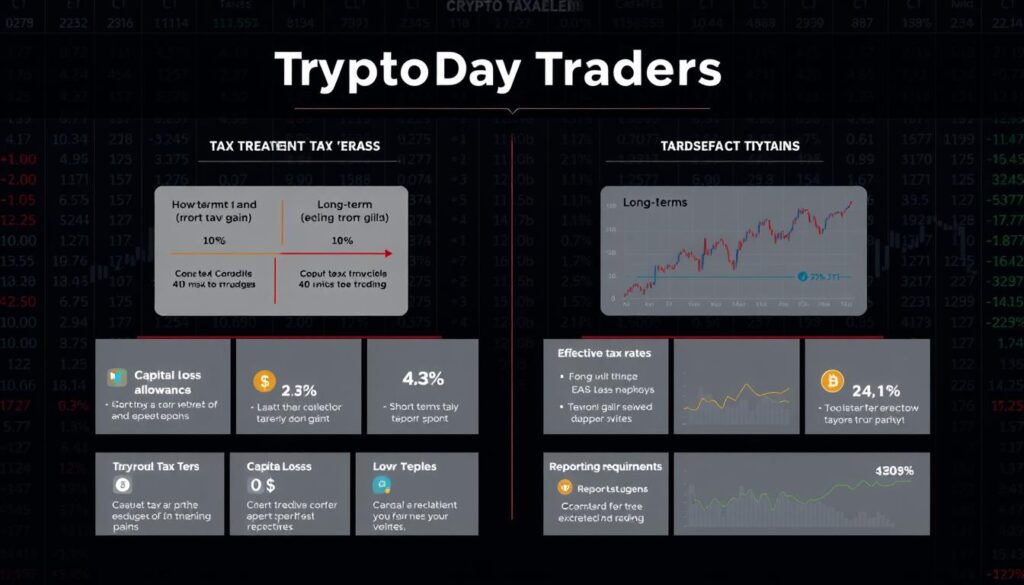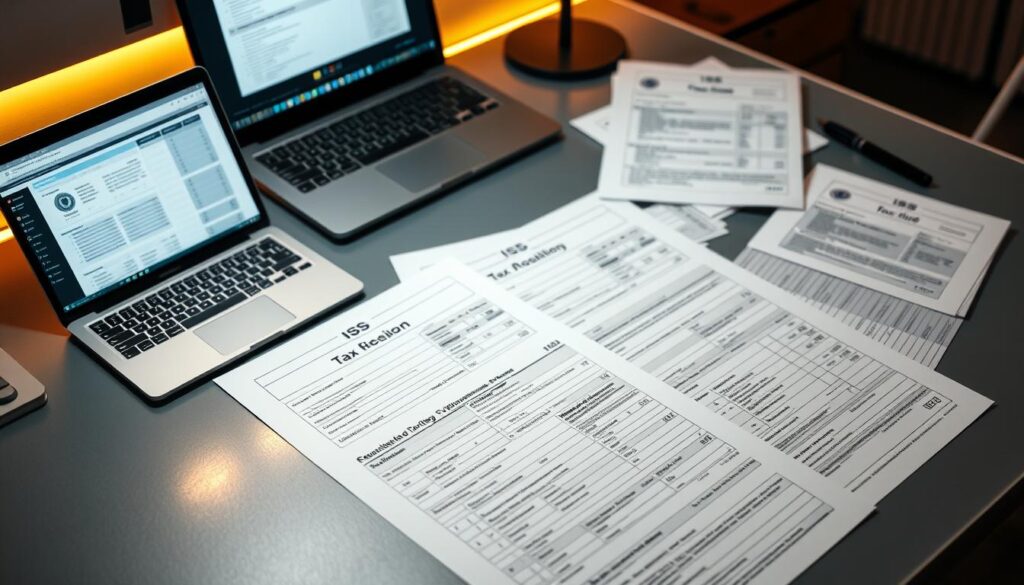Day trading in crypto is full of ups and downs, but it also means you need to know about taxes. The IRS sees crypto as property, so buying, selling, or swapping it is taxable. Knowing about tax rules for crypto day trading is key to staying out of trouble. This guide will help you understand how to handle gains, losses, and income under U.S. tax laws.
But crypto taxes aren’t just about buying and selling. Income from activities like staking or airdrops can be taxed like regular income. Traders need to keep track of every trade’s cost basis and timing to figure out capital gains correctly. TurboTax’s crypto tax guide stresses the importance of keeping accurate records to meet IRS standards.
Key Takeaways
- Every crypto trade triggers taxable events under IRS property rules.
- Day traders must report gains/losses as capital gains or ordinary income.
- Failure to track transactions could lead to audits or penalties.
- Tax software simplifies calculating cost basis and reporting requirements.
- Regulations evolve rapidly, requiring ongoing awareness of crypto tax laws.
Understanding the Cryptocurrency Tax Landscape in the US
The IRS sees cryptocurrencies as property for tax purposes. This rule is key to IRS regulations on cryptocurrency trading. Every trade must be recorded, as not following crypto trading taxes can lead to fines.
Regulations started with Notice 2014-21, saying crypto is property. Since then, rules have changed to include forks, hard forks, and DeFi activities. Now, they also cover staking, NFTs, and other new things.
How the IRS Views Cryptocurrency Assets
All crypto trades are subject to capital gains tax. Sales, exchanges, or trades are taxed. The IRS looks at crypto like stocks but with special tracking needs.
Evolution of Cryptocurrency Tax Regulations
Important milestones include:
- 2014: First guidance on treating crypto as property
- 2020: Rules on hard forks and airdrops
- 2023: Finalized crypto questions on Form 1040
Key Tax Authorities and Their Jurisdictions
Many agencies watch over crypto:
- IRS: Handles tax reports on Form 1040 and Schedule D
- SEC: Regulates tokens like securities under federal law
- State Agencies: Some states tax crypto differently than the federal government
FinCEN: Watches over money transmission and AML rules
To stay out of trouble, keep up with all the rules from these groups.
How Cryptocurrency Gains Are Classified for Tax Purposes
Cryptocurrency transactions are strictly classified under capital gains tax on day trading and broader cryptocurrency tax implications. The IRS splits these into ordinary income and capital gains. Mining or staking rewards are taxed as ordinary income, based on your income tax rate.
Selling crypto for profit is seen as a capital gain. It’s taxed based on how long you held it. If it’s less than a year, it’s short-term. If it’s more, it’s long-term.
- Trading crypto for fiat currency triggers capital gains tax.
- Swapping one cryptocurrency for another creates a taxable event, even without fiat involvement.
- Airdrops or hard forks may count as taxable income if claimed or sold.
Every transaction’s classification affects your tax liability. Buying goods with crypto is also a taxable event. The IRS watches exchanges closely, so tracking every trade is key.
Missteps can lead to penalties. But, holding assets over a year can lower capital gains tax on day trading rates. Check out IRS guidelines to stay clear of trouble. Knowing these rules helps traders make tax-friendly choices.
Tax Considerations for Crypto Day Trading: The Fundamental Framework
Understanding tax considerations for crypto day trading begins with knowing IRS rules. These rules shape how you report and pay taxes on gains and losses. 
Distinguishing Between Day Trading and Investing
Day trading means buying and selling often in short times, seen as business income. Investing is about holding assets for longer. The IRS treats each differently: day trading profits might face income tax rates, while investments get capital gains brackets.
- Day trading: Tracked as ordinary income if frequent and substantial
- Investing: Subject to preferential long-term capital gains rates
The Tax Difference Between Short-Term and Long-Term Holdings
How long you hold assets affects taxes. Short-term gains (held less than a year) are taxed as regular income. Long-term gains (held over a year) get special tax rates.
When Trading Activity Constitutes a Business
The IRS checks if your crypto trading is a business. They look at:
- How often you trade (daily or weekly means it’s a business)
- Time spent on trading (dedicated hours show it’s a business)
- Proof of making a profit
Being seen as a business lets you deduct expenses but you must report on Form 1040 Schedule C.
Calculating Your Crypto Trading Tax Liability
Understanding crypto trading taxes is key. Every profit or loss from trading affects your taxes. Let’s go through how to figure out your tax step by step.
Cost Basis Methods for Cryptocurrency
There are three ways to track your capital gains tax on day trading:
- FIFO (First-In, First-Out): Uses oldest holdings to calculate gains.
- LIFO (Last-In, First-Out): Prioritizes newest assets for tax efficiency.
- Specific Identification: Manually select coins sold to optimize results.
Many traders use spreadsheets or tools like CoinTracking to keep track.
Computing Realized Gains and Losses
To find net profit, subtract what you paid from what you sold for. For example, selling Bitcoin bought at $30,000 for $40,000 results in a $10,000 gain. Keep track of all trades, even losses, to reduce taxable income.
Tax Rate Brackets for Crypto Day Traders
Profits are taxed as ordinary income or capital gains. Short-term gains are taxed at your regular income rate. Long-term gains are taxed at a lower rate.
Impact of Trading Volume
High-volume traders need to do complex calculations. Use software to automatically calculate basis and track many trades. For instance, a trader with 100+ trades a year could save $5,000 a year by choosing the right cost basis method.
Essential Record-Keeping Practices for Crypto Day Traders
Effective tax reporting for day traders begins with keeping detailed records. Each trade must be documented with timestamps, crypto amounts, and the value in fiat at the time of the transaction. Also, note any fees and the exchange where the trade happened. Keeping records for all transactions, even non-taxable ones like wallet transfers, is crucial for audit purposes.
- Track all trades: Include buy/sell orders, airdrops, and staking rewards.
- Record fees: Capture exchange, network, and transaction costs.
- Store receipts: Keep invoices for hardware wallets, software subscriptions, and educational materials.
Not having historical data can lead to penalties. Use crypto tax software (like CoinTracking or Ledger) to automatically track your trades. For those with fewer trades, a spreadsheet can work, but it needs careful upkeep. Always keep records for at least six years, as the IRS requires, and back them up both online and offline.
Being proactive with your records helps ensure accurate crypto tax compliance filings. Well-organized records make audits easier and help avoid mistakes when filling out Form 8949. Choose a system that fits your trading volume—automation helps reduce errors and meets legal standards.
Navigating Cryptocurrency Tax Forms and Reporting Requirements

Day traders must understand tax reporting for day traders to avoid trouble. They need to know about IRS forms. Form 8949 is for crypto sales, which go into Schedule D for capital gains.
Each sale’s details like date, cost basis, and proceeds must be correct. Mistakes can lead to audits under IRS regulations on cryptocurrency trading.
Form 8949 and Schedule D Filing Instructions
Here’s how to file:
- Record each crypto sale on Form 8949, noting asset type and trade dates.
- Move totals to Schedule D, showing short-term and long-term gains.
- Attach both forms to your federal tax return.
FBAR and FinCEN Reporting Considerations
Traders with crypto in foreign accounts over $10,000 must file FinCEN Form 114 (FBAR). Exchanges like Coinbase might report transactions. But, self-directed accounts need tracking.
Ignoring this can lead to fines of up to 50% of assets.
State-Level Tax Reporting for Crypto Traders
States like California see crypto as property. Texas doesn’t tax gains. But, each state has its own rules.
Check state guidelines for unique disclosures. Keep records for each state’s deadlines.
Tax Implications of Different Trading Activities and Exchanges
Every trading strategy and exchange choice has its own cryptocurrency tax implications. Activities like arbitrage, margin trading, and futures contracts each have their own rules. For example, leveraged positions can lead to gains even when the market goes down. On the other hand, liquidations might result in losses.
- Centralized exchanges often report trades to tax authorities, making crypto tax compliance easier. But, decentralized platforms (DEXs) require users to keep track of all transactions themselves.
- DeFi activities, such as providing liquidity or yield farming, generate rewards that are taxed as income. Even governance tokens earned through staking can be taxable.
- International exchanges need careful attention for cross-border rules. U.S. traders using platforms abroad must report their holdings to avoid penalties under FBAR regulations.
Rebates or airdrops from exchanges are considered taxable income, even if they’re free tokens. Futures contracts involving stablecoins or leveraged tokens add more complexity. Traders must keep track of every swap, swap fee, and interaction in DeFi ecosystems.
Not accounting for these details can lead to underreporting income. Crypto tax software can help with tracking, but knowing the specific rules is key for accurate filings.
Leveraging Tax Deductions Available to Crypto Day Traders
Crypto day traders can lower their taxable income by claiming eligible tax deductions for day traders. The IRS lets you deduct expenses directly related to trading. This can help reduce your taxable profits. Keeping detailed records is key to staying compliant with tax considerations for crypto day trading and avoiding audits.
Start with workspace expenses. If you have a dedicated home office for trading, it counts. You can calculate the deduction based on square footage or expenses. Trading equipment like high-end computers or monitors might qualify for immediate expensing under IRS Section 179 or depreciation over time.
- Hardware costs can be written off using IRS guidelines for business equipment.
- Software subscriptions for market analysis or portfolio tracking are fully deductible.
Professional development is important too. Courses on technical analysis or blockchain technology are business expenses. Fees for accountants or tax advisors specializing in crypto also qualify. Keep all receipts and invoices for these services.
Trading platform fees, including exchange commissions, are deductible as operating expenses. Keep a ledger to track every fee. Use separate accounts for trading income and personal funds to avoid mix-ups during audits.
Regularly check IRS publications and talk to tax professionals. This ensures your claims follow current rules. Detailed records of each deduction type protect traders during audits and help maximize savings.
The Trader Tax Status: Qualifying and Benefits
Crypto day traders can get big tax breaks by getting the IRS’s trader tax status (TTS). This status changes how you report expenses and profits. It offers unique savings chances. To get it, traders must meet IRS rules, like trading often and analyzing markets.
They also need to hold assets for less than a year. High account balances and serious dedication to trading are also key signs of a business to the IRS.
Those who qualify get three big benefits. Tax deductions for day traders grow to include software, education, and office costs. The Section 475 mark-to-market election lets traders write off losses without selling assets. Also, Solo 401(k)s let you contribute more to retirement than regular accounts.
But, you must report your trades properly under TTS. This means keeping detailed trade logs and filing Form 1120. It shows you run your trading like a business.
But, there’s a risk if you claim TTS without being eligible. IRS audits could lead to penalties. Traders close to qualifying can tweak their strategies to meet the criteria. Getting advice from a tax expert helps stay compliant and maximize deductions. Taking these steps can turn tax liabilities into trading advantages.
Common Tax Pitfalls and Mistakes in Crypto Day Trading
Day traders often face hidden tax obligations that crypto tax compliance requires. IRS regulations on cryptocurrency trading demand reporting every transaction. Yet, many miss important details. A single oversight can lead to audits or fines.
Overlooking Key Taxable Events
Traders often ignore everyday actions that trigger taxes. These include:
- Swapping one crypto for another (e.g., Bitcoin to Ethereum)
- Buying goods/services with crypto
- Receiving staking rewards or airdrops
- Ignoring hard forks creating new assets
Misusing Wash Sale Rules
Selling crypto and buying it back within 30 days resets its cost basis. This can skew gains, making them taxable. Many traders miscalculate, leading to underreported profits. Always track holding periods to avoid penalties.
Like-Kind Exchange Myths
Before 2017, crypto swaps were tax-deferrable under like-kind exchange rules. The 2017 Tax Cuts and Jobs Act removed this exception. Traders who still treat crypto swaps as tax-free risk audits. All exchanges now trigger taxable events.
Additional risks include:
- Unreconciled exchange reports vs actual trades
- Mixed cost basis calculations across wallets
- Unreported lost/stolen crypto (treated as sales at zero basis)
Maintain detailed records and use trackingers to avoid these mistakes. Regular audits of transactions ensure alignment with IRS guidelines.
Tax Planning Strategies to Optimize Your Crypto Trading Position
Effective tax planning for crypto day trading means making smart moves to cut crypto trading taxes. Traders can plan their trades to match gains and losses with market trends. This way, they can use tax-loss harvesting to balance out profits. Also, timing trades around IRS deadlines helps avoid surprises when filing taxes.
- Forming legal entities like LLCs or S-Corporations to separate personal and trading income
- Exploring retirement accounts accepting crypto, such as self-directed IRAs
- Evaluating state tax rates before relocating—some states exempt crypto capital gains
High-volume traders use advanced tactics. Donating appreciated crypto to charities skips the need to sell, avoiding capital gains. Investing in opportunity zones can also delay taxes on gains. But, it’s key to keep detailed records to avoid audits.
Experts suggest checking Form 8949 records every quarter to tweak strategies. For example, traders in California might move to Texas to dodge 6.4% state income tax on crypto profits. For more on IRS tax implications for crypto, check out this link.
Choosing the right entity depends on income levels—those making over $200k might benefit from LLCs. Always work with tax advisors to keep up with IRS changes. This way, tax planning can help keep more of your earnings.
Handling Crypto Tax Audits: Preparation and Response
When the IRS looks into your crypto dealings, being compliant is key. Audits often happen because of missing information. Taking early steps can help you stay ahead.

Red Flags That May Trigger an IRS Audit
Here are some reasons why you might get audited:
- Big, unreported crypto deals over $10,000.
- Discrepancies between what you report and what exchanges show.
- Too many trades that seem to balance out gains.
Documentation Requirements During an Audit
Auditors need solid proof of:
- When and how much you bought or sold crypto.
- Details like transaction IDs and platform logs.
- Proof from exchanges, like Form 1099-K.
Working With Tax Professionals During Audits
Experts in crypto tax can:
- Check audit notices to avoid mistakes.
- Argue IRS points on tricky crypto deals.
- Work out deals based on IRS crypto rules.
Being ready for an audit means keeping up-to-date records and getting help from tax pros every year. Being prepared is all about starting early.
Advanced Tax Considerations for High-Volume Crypto Traders
High-volume crypto day traders face unique tax challenges. They need special strategies because of their high transaction frequency. This is especially true for those using algorithmic or high-frequency strategies.
Tracking thousands of trades requires automated tools. These tools help gather data for accurate tax reporting.
- Global Market Risks: Trading across borders can lead to foreign exchange gains/losses. These are taxable under IRS rules. Offshore entities may trigger controlled foreign corporation rules, requiring careful compliance.
- Entity Structures: Using partnerships, trusts, or LLCs might help with taxes. Legal structures must match trading activity to avoid penalties.
- Deferral Strategies: The constructive receipt doctrine allows delayed reporting for pending settlements. But misuse can lead to audits. Tax planning for crypto day trading must balance deferral with IRS guidelines.
- Dealer Status: Managing others’ assets while trading could make traders dealers. This shifts gains to ordinary income. Clear documentation is key.
High-volume traders need tax professionals to audit-proof their records. Complex scenarios like multi-jurisdictional trades or entity ownership need tailored solutions. Ignoring these tax considerations increases audit risks.
Proactive tax planning for crypto day trading ensures compliance. It also helps maximize savings.
Staying Ahead of the Curve in Cryptocurrency Tax Compliance
Cryptocurrency markets are always changing, and so are the tax rules. In the US, traders need to keep up with new laws and how tax authorities enforce them. With tools like blockchain tracking, tax agencies can now track transactions closely. This makes it crucial for traders to keep detailed records to avoid fines.
New laws might change how we plan taxes for trading cryptocurrencies. Rules on stablecoins, DeFi, and cross-chain swaps are being considered. Traders should watch Treasury updates and congressional talks on digital assets. This way, they can prepare for new tax demands on crypto products.
Staying compliant means staying informed. Traders should sign up for IRS alerts and join groups like the American Institute of CPAs’ crypto task force. This gives them the latest advice. For tricky issues like NFT sales or token rewards, it’s wise to talk to tax lawyers who know digital assets.
Compliance is a mix of creativity and strict rules. Traders should check their tax plans against IRS notices and use IRS-approved software. Being ready today helps protect your finances in a changing regulatory world.
FAQ
What are the tax implications of crypto day trading?
The IRS sees cryptocurrencies as property. So, crypto day traders face capital gains tax on profits. The tax rate depends on how long you hold the assets. Short-term gains are taxed like regular income, while long-term gains have lower rates.
How should I report my crypto trading gains on tax forms?
You should report gains and losses on Form 8949 and Schedule D. Include details like cost basis and sale dates. Keeping accurate records is key to following IRS rules.
Are there any deductions available for crypto day traders?
Yes, you can deduct many expenses. This includes home office costs, trading gear, software, and education. Keeping detailed records is important for tax deductions and following the law.
How does the IRS define a taxable event in cryptocurrency trading?
Taxable events include selling crypto for cash, trading one crypto for another, or using crypto to buy things. Also, getting rewards from staking or mining is taxable. Each event can lead to capital gains or losses that need to be reported.
What are the potential pitfalls to avoid when trading crypto regarding taxes?
Avoid overlooking taxable events and misusing wash sale rules. Also, be careful with capital gains calculations. Remember, the IRS no longer allows like-kind exchanges for crypto, which can lead to mistakes.
What strategies can I use to optimize my tax position as a crypto day trader?
To optimize taxes, time your gains and losses well. Use tax-loss harvesting and set up trading entities like LLCs. Plan for state taxes too. A tax professional can help with these strategies.
How can high trading volume affect my tax calculations?
High trading volume makes tax calculations harder. You need to track many transactions and calculate cost basis. Using software can help keep records accurate and simplify reporting.
What should I do if I get audited regarding my crypto trading activities?
If audited, have all your records ready. This includes transaction details, cost basis, and any exchange correspondence. A tax expert in crypto can guide you through the audit.
What is the trader tax status, and how can it benefit me?
The trader tax status (TTS) lets you deduct trading expenses as business costs. This can save a lot on taxes. It’s worth considering for traders who trade often and in large amounts.


No comments yet